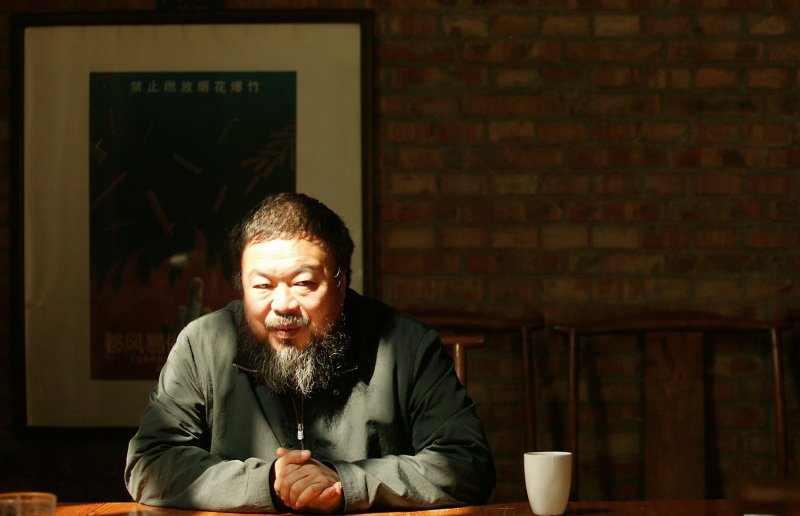Ai Weiwei, 53, one of China's most prominent avant-garde artists and human rights activists, poses for a portrait in his Beijing studio on April 25, 2009. U.S. Secretary of State Hillary Clinton urged China to free dozens of government critics rounded up this year including Ai Weiwei and said Beijing's human rights record was worsening. UPI/Stephen Shaver |
License Photo
BEIJING, Nov. 2 (UPI) -- Chinese authorities have told Ai Weiwei, a celebrated artist and prominent critic of the government, that his design company must pay $2.3 million in back taxes.
Weiwei said tax authorities gave him 15 days to pay the tax demand, which he says he doesn't owe.
In June, China's official government news agency Xinhua reported that Beijing police released Weiwei from prison "because of his good attitude in confessing his crimes" as well as for health reasons.
The Xinhua report said Weiwei had "repeatedly said he is willing to pay the taxes he evaded."
The amount he reportedly had to pay in June was the equivalent of $1.85 million in back taxes and accumulated fines.
Beijing Fake Cultural Development, a company controlled by Weiwei, was found to have evaded a huge amount of taxes and intentionally destroyed accounting documents, police said.
Weiwei, 54, was detained for almost three months, although never officially arrested, and accused of anti-government propaganda.
"During my 81 days of arrest they accused me of subversion of state power," he said in an interview with the BBC.
Tax authorities are demanding that the company, and not him, pay the taxes.
"It's a design company with only three people working there and in our account there is only a few hundred dollars," he said. "If they want to prove that I am such a bad guy, why don't they behave and make the process more transparent and understandable?"
He said the tax department has given him no details of why the money is owed.
"They refuse to give me anything," he said. "It's really a pity because everybody in (Chinese) society is watching to see how low this state can go, to not allow people to have opinions, this is really devastating."
Weiwei was taken into custody in Beijing in April as he boarded a flight for Hong Kong. His family insisted his detention, where he wasn't allowed to talk to media or use the Internet, was for his political activities.
Among his artistic and design work is a collaboration with Swiss firm Herzog and de Meuron as the design consultant for the 91,000-seat Beijing National Stadium, also known as the "Bird's Nest," for the 2008 Summer Olympics.
A year before the Games opened, he dismissed his work on the project, saying the Bird's Nest and the Beijing Games in general were a "pretend smile." It was an attempt by the government to produce a "fake image" to divert attention at home and abroad from China's poor human rights record.
"I would feel ashamed if I just designed something for glamour or to show some kind of fake image," he said in August 2007.
He was a prominent supporter of an investigation into corruption by government officials in building substandard schools which allegedly contributed to the deaths of more than 5,000 students in 2008 Sichuan earthquake.
More than 7,000 schoolrooms collapsed during the earthquake that also injured 15,000 students. The total death toll was around 70,000 people and 375,000 injuries.
Last month the influential British magazine ArtReview placed Weiwei in top of its annual Power 100 list. The Chinese government was quick to condemn what it said was a tasteless political move by the magazine.
China has many artists who have sufficient ability," said Chinese Foreign Ministry spokesman Liu Weimin. "We feel that a selection that is based purely on a political bias and perspective has violated the objectives of the magazine."





